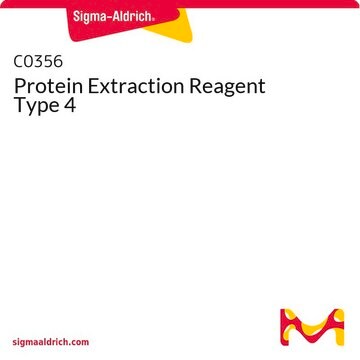2100
Protein-Concentrate Kit (Micro)
Protein-Concentrate Kit (Micro) is suitable for concentrating proteins for running gels, raising antibodies, protein purification, protein assays & other applications.
Sign Into View Organizational & Contract Pricing
All Photos(1)
About This Item
UNSPSC Code:
12161503
eCl@ss:
32161000
Recommended Products
manufacturer/tradename
Chemicon®
technique(s)
protein purification: suitable (concentration)
application(s)
sample preparation
shipped in
ambient
General description
The Chemicon Protein-Concentrate kit uses a proprietary reagent Universal Protein Precipitation Agent (UPPA). Protein solutions as dilute as 1 ng/mL can be quantitatively concentrated into a small volume. Protein precipitation is not effected by the presence of detergents, chaotropic, or other common laboratory agents. After precipitation, the precipitate is suspended in a small volume of Precipitate Suspension Buffer supplied with each kit. If the protocol is followed correctly, the recovery is generally 100%. There are enough reagents for concentrating up to 10 mL of dilute protein solution.
Packaging
10 samples
Components
UPPA-I 30 Ml
UPPA-II 30 mL
OrgoSol Buffer 50 mL
UPC-Wash 2.0 mL
UPC-SEED 0.3 mL
Precipitate Buffer I 2.0 mL
Precipitate Buffer II 0.5 mL
UPPA-II 30 mL
OrgoSol Buffer 50 mL
UPC-Wash 2.0 mL
UPC-SEED 0.3 mL
Precipitate Buffer I 2.0 mL
Precipitate Buffer II 0.5 mL
Storage and Stability
Store at room temperature for up to 6 months from date of purchase. To avoid possible microbial contamination, dispense all solutions aseptically.
Legal Information
CHEMICON is a registered trademark of Merck KGaA, Darmstadt, Germany
Disclaimer
Unless otherwise stated in our catalog or other company documentation accompanying the product(s), our products are intended for research use only and are not to be used for any other purpose, which includes but is not limited to, unauthorized commercial uses, in vitro diagnostic uses, ex vivo or in vivo therapeutic uses or any type of consumption or application to humans or animals.
Signal Word
Danger
Hazard Statements
Precautionary Statements
Hazard Classifications
Aquatic Chronic 2 - Eye Dam. 1 - Flam. Liq. 2 - Met. Corr. 1 - Skin Corr. 1A - STOT SE 3
Target Organs
Central nervous system, Respiratory system
Storage Class Code
3 - Flammable liquids
Certificates of Analysis (COA)
Search for Certificates of Analysis (COA) by entering the products Lot/Batch Number. Lot and Batch Numbers can be found on a product’s label following the words ‘Lot’ or ‘Batch’.
Already Own This Product?
Find documentation for the products that you have recently purchased in the Document Library.
Eric W Refsland et al.
Nucleic acids research, 38(13), 4274-4284 (2010-03-24)
The human APOBEC3 proteins are DNA cytidine deaminases that impede the replication of many different transposons and viruses. The genes that encode APOBEC3A, APOBEC3B, APOBEC3C, APOBEC3D, APOBEC3F, APOBEC3G and APOBEC3H were generated through relatively recent recombination events. The resulting high
Ankita Anusruti et al.
Obesity facts, 13(1), 66-76 (2020-01-28)
In the literature, obesity is discussed as a determinant of high oxidative stress (OS). Hence, prevention or reduction of obesity could prevent high OS and subsequently serve as a target for "healthy aging." Diacron's reactive oxygen metabolites test (D-ROM) and
Custom-designed MLPA using multiple short synthetic probes: application to methylation analysis of five promoter CpG islands in tumor and urine specimens from patients with bladder cancer.
Serizawa RR, Ralfkiaer U, Dahl C, Lam GW, Hansen AB, Steven K, Horn T, Guldberg P
The Journal of Molecular Diagnostics : JMD null
C C Hull et al.
The British journal of ophthalmology, 83(6), 656-663 (1999-05-26)
To evaluate the image quality produced by polypseudophakia used for strongly hypermetropic and nanophthalmic eyes. Primary aberration theory and ray tracing analysis were used to calculate the optimum lens shapes and power distribution between the two intraocular lenses for two
Jacob Nedergaard Pedersen et al.
Food chemistry, 310, 125858-125858 (2019-11-23)
This work established a binary ionic liquid-solvent system for effective enzymatic esterification of naturally occurring phenolic glycosides (flavonoids); which could result in a dramatic enhancement of Novozym 435-catalyzed esterification of esculin, demonstrating a great synergetic effect. In essence, [OMIM][BF4]-toluene and
Our team of scientists has experience in all areas of research including Life Science, Material Science, Chemical Synthesis, Chromatography, Analytical and many others.
Contact Technical Service











